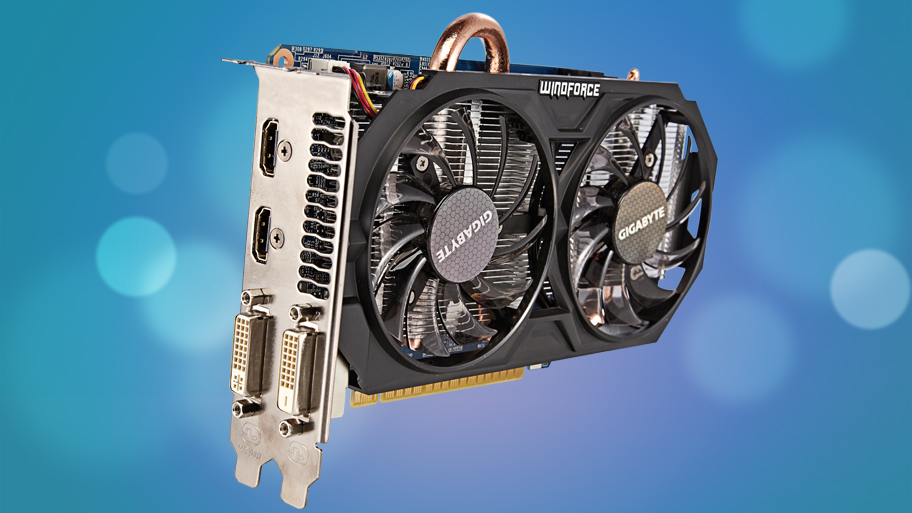TechRadar Verdict
Better than the competition, but just. Overall one of the better GTX 750 Ti on the market. A best buy, probably not.
Pros
- +
Surprisingly impressive cooling
- +
Quiet fan
- +
Good value
Cons
- -
Extra six-pin PCIe power connector required
- -
Not very versatile
Why you can trust TechRadar
Gigabyte might well be tagging this card as the 'OC edition' of its GTX 750 Ti range, but I've got a feeling that's rather overselling it. Compared to the EVGA FTW card adding a hefty 169MHz on top of the baseclock, Gigabyte's measly 13MHz boost seems fairly conservative.
But we actually don't have a problem with that. The added GPU frequency EVGA has squeezed out of its GM107 chip is pretty impressive on a numerical footing, but in performance terms it doesn't bring a lot to the gaming party.
Sure, it makes the FTW card quicker than both this Gigabyte version and the reference card from Nvidia, but not by a huge amount. The problem is that at £131 the EVGA card is bumping into R9 270 territory, and that card will best any GTX 750 Ti you care to throw its way.
That means Gigabyte's OC Edition is actually a pretty wise buy. It hasn't spent ages ensuring it's sorted out enough capable GM107 GPUs to guarantee it can fulfil the necessary 169MHz extra clockspeed, and so isn't asking the same sort of price as EVGA. In fact, Gigabyte's card costs the same as the reference-clocked GTX 750 Ti.
And with that you still get the impressive Windforce cooling array. The flimsy plastic shroud doesn't really inspire confidence, but it's far quieter than the ACX setup and still manages to hit the same chilly peak operating temperature. That will rise if you match the EVGA clockspeed, but at least the Windforce setup allows you to get there if you so wish.
Quietly does it
For the average gamer on a budget looking for a decent bargain gaming upgrade, the Gigabyte card is really quite impressive. It has the physical trappings of OC Edition cards, but doesn't suffer because of its less-than-enthusiastically overclocked GPU.
Put up against the quicker, louder, pricier EVGA FTW edition, we'd be tempted to stick with the slower Gigabyte card. You'll be able to squeeze similar performance out of it if you want to sacrifice some aural comfort, but the gaming speed you can already get from the GTX 750 Ti is pretty darned good for a £114 card.
All is not completely rosy though; I'm not happy that this card requires an extra six-pin PCIe power connector. It's a real shame, because it stops it being as versatile and powerful a tool for PC gaming proliferation. Measuring the peak power draw makes this something of a surprise – the OC Edition at stock speeds actually sips a little less peak platform power than the reference GTX 750 Ti powered purely by the PCIe bus.
One of the things that really impressed me about the new Maxwell GPU was its low power requirement, but card manufacturers slapping on extra power demands somewhat diminishes that appeal. This GTX 750 Ti OC is still a quality budget gaming card, but lacks the versatility that a bus-powered reference version offers.
Benchmarks
DirectX 11 1080p gaming performance
Bioshock Infinite: (Min) Average fps: higher is better
Gigabyte GTX 750 Ti OC: (9)48
EVGA GTX 750 Ti FTW: (13)51
Nvidia GTX 750 Ti: (6)47
GRID 2: (Min) Average fps: higher is better
Gigabyte GTX 750 Ti OC: (37) 50
EVGA GTX 750 Ti FTW: (43) 56
Nvidia GTX 750 Ti: (39) 49
Peak platform power
100% GPU load: Watts: lower is better
Gigabyte GTX 750 Ti OC: 160
EVGA GTX 750 Ti FTW: 172
Nvidia GTX 750 Ti: 164
Verdict
The EVGA card is clearly clocked higher and gives better gaming performance, but not by much. What it does offer are higher minimum frame rates compared with this Gigabyte card. The platform power test though does put into question the need for an additional six-pin PCIe connector on this card.
